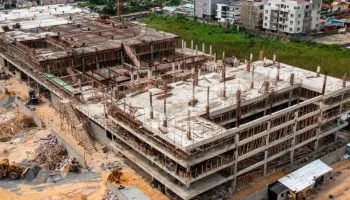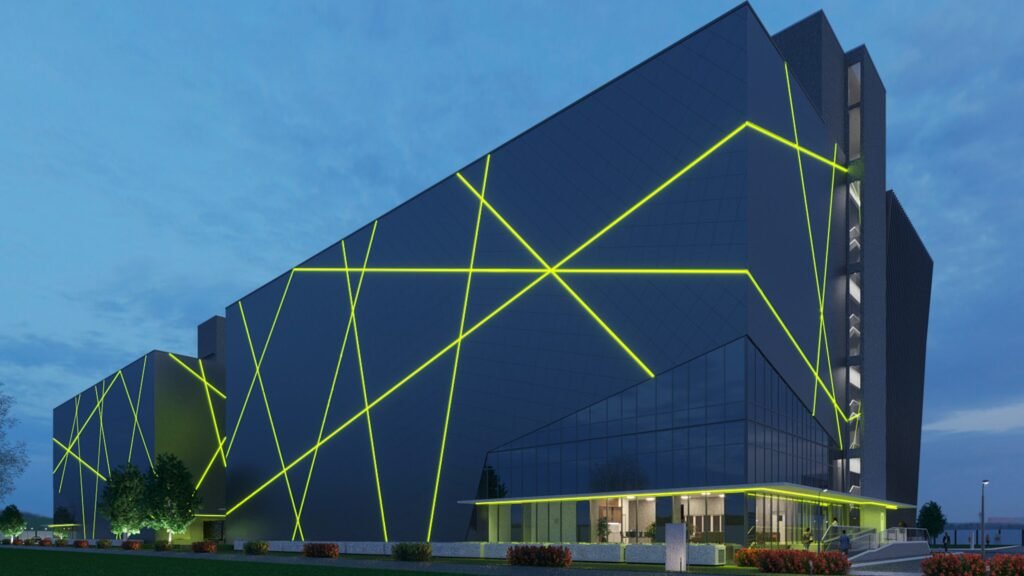Lagos is positioned at the heart of Nigeria’s data infrastructure growth, accounting for nearly 70 % of all new power capacity projected in the coming years. That’s the standout finding from the recently published “Nigeria Colocation Data Center Portfolio Analysis Report 2025”, which maps current and future colocation assets across the country.
As of mid-2025, Nigeria still operates roughly 80 MW of colocation data centre capacity, but the pipeline is impressively ambitious: an additional 340 MW is estimated to come on stream by 2028. Lagos emerges as the clear growth engine, absorbing almost 150 MW of that new capacity by 2025 alone.
This shift signals more than just infrastructure expansion: it underlines a broader leap in Nigeria’s digital maturity, led by demand from cloud providers, telecoms, and enterprise users seeking local hosting, low latency, and regulatory compliance.
Table of Contents

Snapshot of Existing and Upcoming Facilities
The report examines 18 existing and 16 upcoming colocation data centres across Nigeria. It provides granular data on each site: white-floor area, IT load capacity, rack densities, power/cooling designs, redundancy levels, and pricing for half/full rack deployments.
Key figures at a glance:
- Current IT load / power usage: ~ 80 MW across all live sites
- Pipeline additions (2024–2028): ~ 340 MW
- Projected investment to 2027: ~$1.7 billion into new data centre construction
- Geographic spread: Beyond Lagos, major nodes include Abuja and Ikeja
One interesting note: the report refers to 20 “existing” and 14 “upcoming” centres in its summary metadata — a slight discrepancy from the 18/16 count detailed inside. That likely reflects the inclusion of smaller or soon-to-open facilities.
The analysis also includes retail colocation pricing tiers (quarter rack, half rack, full rack) so that prospective clients and investors can benchmark cost structures across operators.

Players, Investments & Market Context
This wave of expansion isn’t happening in a vacuum. Nigeria’s colocation landscape is evolving quickly, driven by strong fundamentals and firm investments.
Top operators already active or entering the market include:
- Africa Data Centres (Cassava)
- Open Access Data Centres
- 21st Century Technologies
- Nxtra (Airtel)
- Equinix (via MainOne)
- Digital Realty (via its Medallion acquisition)
- Rack Centre
Globally, colocation and hyperscale providers are tapping Nigeria via partnerships or outright acquisitions of local firms. Equinix’s deal for MainOne and Digital Realty’s acquisition of Medallion are high-profile examples.
On the investment front, forecasts suggest Nigeria’s data centre sector could attract nearly USD 2.94 billion from 2025 to 2030. Some projections expect the cumulative sector value locally to hit between USD 648 million and USD 972 million by 2032, depending on the source.
Mordor Intelligence, for instance, estimates Nigeria’s total IT load capacity will climb from ~ 209 MW in 2025 to ~ 317 MW by 2030. Others caution that the market must contend with persistent energy and grid challenges.
Indeed, Nigeria’s power supply reliability is a constant headwind. Many operators must deploy backup generators, UPS systems, and advanced cooling to maintain service level agreements.
Still, demand-side trends are strongly supportive. Growth of cloud adoption, AI workloads, 5G rollout, and regulatory data residency rules are all pushing enterprises and public agencies to prefer local hosting over distant facilities.
An estimate from TechCabal notes that Nigeria’s ~ 26 data centres now account for roughly 15 % of Africa’s total capacity — a reminder of how important the country is to the continent’s digital backbone.
Risks, Challenges & Strategic Imperatives
This phase of data centre growth is exciting — but it carries risks. Stakeholders will need to mind a few key issues to ensure yield, resilience, and long-term viability.
- Energy security & cost escalation
Grid instability and blackouts remain a fact of life in Nigeria. Operators must overprovision backup capacity and negotiate fuel and maintenance costs.
Rising global equipment costs, inflation, and supply-chain constraints could further raise CapEx and OpEx. - Overcapacity risk in select regions
Lagos is drawing the lion’s share of investment, raising concerns of overbuild or underutilisation if demand expectations fall short. - Regulatory & policy alignment
Availability of incentives, incentives for renewable power, import duties on critical components, and data protection laws will all affect returns. - Technical standards & interoperability
Operators must adopt world-class standards (e.g., Tier III/IV design, modular cooling, efficient PUE) to attract multinationals. - Competition from hyperscale or edge builds
As demand scales, large cloud providers may prefer constructing their own facilities or edge nodes, which can undercut colocation demand.
Yet, for investors and infrastructure firms with patience and execution discipline, the upside remains compelling. The combination of rising domestic demand, digital services penetration, and relative scarcity of high-quality hosting capacity means that well-positioned operators can command premium pricing and sticky customer relationships.

Conclusion
The Nigeria Colocation Data Center Portfolio Analysis Report 2025 upgrades our understanding of the present and future landscape: robust pipeline, concentrated growth in Lagos, and serious investment momentum.
But success in this market will depend not just on how many megawatts get built, but how well they are managed, powered, and filled over time. Stakeholders who align capital, energy strategy, regulatory foresight, and disciplined execution now have a window to shape Nigeria’s digital infrastructure for decades to come.
Join Our Social Media Channels:
WhatsApp: NaijaEyes
Facebook: NaijaEyes
Twitter: NaijaEyes
Instagram: NaijaEyes
TikTok: NaijaEyes





